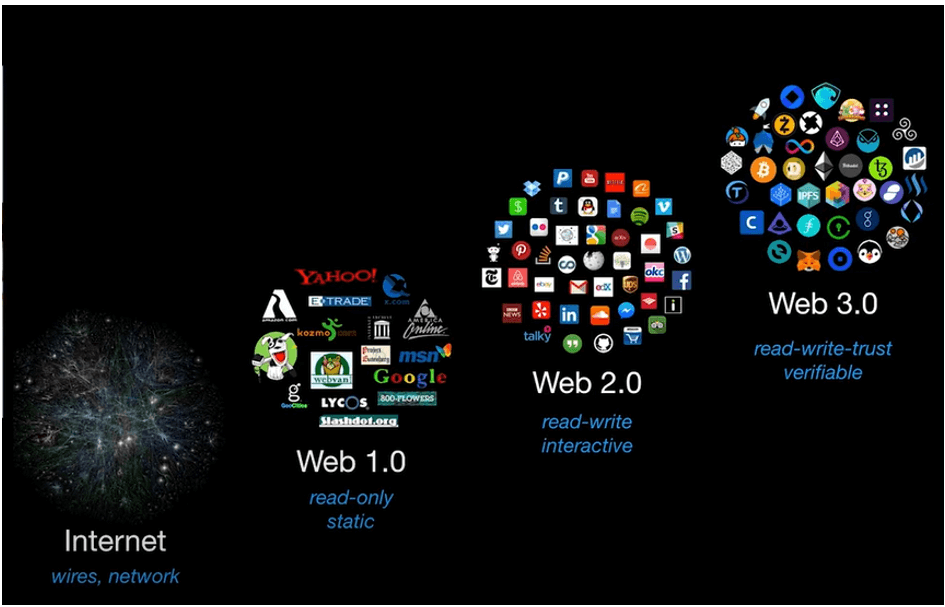Web 3 has a mission—to give data ownership back to users. In this second part, learn about Web 3 use cases, where the trends are going, and what its limitations are today.
Web3 recall…
In part 1, found here, we established the following ideas: Web2 enables users to do many useful activities using the internet, but in that process, users forfeit their data ownership because copies of their data are generated and sold by centralized service providers (Facebook, Google).
We then introduced the idea that it would be more empowering if users kept the ownership of their data, or at least it would be comforting to introduce less system frailties subject to hacks via a decentralized network.
Web3 uses blockchain technology, a network of computers that offsets the risk of a single vulnerable server by offloading the pressure on multiple interconnected networks. In other words, data is stored in multiple locations.
Blockchain is used to build the Web3 protocol in a way that replaces centralized authorities, or servers, via its trustless ledger faculties. Nobody is in charge. It is not an all-knowing AI, but it is a governance system that dilutes the risk via large networks and incentive structures that reward participants for doing an honorable job.
Evolution from web 1 to web 3
Source: https://www.youtube.com/watch?v=d-iigN2WjvY&ab_channel=ProtocolLabs
Web3 trends…
There are three Web3 innovation trends: money, decentralized services, and control.
Money in the new web will not be like money you have in your wallet today. It will be one with the actual web in question. This type of money is referred to as a ‘‘native’’ currency, a currency that is one with the network.
Because of this feature, the new web will enable transaction costs to be lower for cross-border payments (something Cardano, another project, is keen on doing too) and offer the unbanked a more secure method by which to store currency.
The new web will also lead the way to something called decentralized services. This means that anyone can build, run, and use services void of the overbearing authority of a single entity, an entity that decides how the code works.
This will create efficiencies in things like peer-to-peer transactions. Users will be able to upvote content via small payments which would benefit creators in getting a larger percentage share of the earnings. With YouTube for example, creators are paid relatively less for their content because the centralized authority (Google) picks the markups.
Thirdly, the last trend is about control, especially around identity and data. Web 3 will allow users to use their own personal identities as a sort of stake, instead of having to rely on a service provider like Facebook to do it for them. This implies that less of the internet will exist through platforms and systems that collect data about us without our knowledge. Through this process of retrieving one’s data, web 3 allows users to capture the value of data themselves.
Web3 use cases…
In part 1 we asked who will pay for all these new services built and run-on Web 3? Well, it would be through this re-converted data value-capture scheme. In this new value-capture model, the built-in bi-directional framework would satisfy verifiability of peer-to-peer payments and deliver on the promise of an efficient market via the native currency.
Here is an example of what this means. Take Facebook, which offers a nice service to chat with friends and join groups—well, it is impossible for folks outside the company to build on top of it to add features without the centralized authority checking off on it. Scrap that now, because an open service system allows anyone to join in on the development and governance, and voting up the best inventions. The technical word for this is ‘’forkability’’.
One aspect of this project worth taking a note of, and previously explored in the Filecoin article, is the commoditization of fixed resources like storage, bandwidth, and computational power. With Filecoin for example, users can commoditize their fixed storage space and basically rent it out to other people, much like a cloud service—instead of being dominated by some duopoly, the millions of users would be able to participate and be paid.
Another interesting use case is with regards to data censorship. One example is that NASA wants to store data forever about climate change in such a way that is immutable, meaning nobody can mess around with the data, and this is already happening today.
Another example is with regards to political censorship. During the referendum in Catalunya in 2017, the Spanish government blocked the IP addresses of any website that was giving information about where to vote. Using a Web 3 protocol called IPFS, which aims to replace protocols used for static webpage delivery i.e., HTTP (hypertext transfer protocol is the foundation of data communication for the world wide web), developers were able to free up voting information access.
Limits to Web3 so far…
Some folks have pointed out that Web 3 is not a 100% guaranteed thing, meaning it could fail as a project. A lot of details about Web 3’s success remains open-ended such as the following considerations: A service that is controlled by centralized authorities or a single company might have a more coherent product vision and is usually able to rapidly iterate on new features.
To this day, it remains unclear exactly if the cost-savings of running decentralized applications will come to fruition since the way Web3’s blockchain protocol (the layers of code that come together as a whole to make things work) is layered, could introduce redundancies that could become expensive.
Another concern is product market fit. Some argue that there might just not be enough traction from users because it can be argued that most people just do not care that their data is being sold off.
What happens if decentralized applications and the uses cases we talked about above do not appeal to users or worse yet, remain too niche for them to even know about them?
There is so much educational work that still needs to be done around bitcoin, let alone blockchain. Governments and regulators have also showcased reluctance around crypto, with people like Janet Yellen focusing on the illicit activities and fiat circumvention faculties cryptos offer. The truth is however that today the number of illicit activities via bitcoin exist, but are rapidly shrinking and minimal.
There are legitimate worries to have with regards to illicit acts detrimental to society, but the same argument holds for cash—is it not used for illicit acts? But should we ban it?
Web 3 could see some backlash from legislators, but in the meantime, Big Tech is probably its biggest opponent.





